by Olivia Koupaki and Manfreddy Binyet, WANIDA coordinators
Professor Gordon Awandare gave his inaugural lecture “How our Immune System Acquired Tolerance to Malaria and Helped us Survive COVID-19” at the Great Hall, University of Ghana on 8th June 2023. He spoke about how the COVID-19 pandemic unfolded in Ghana and West Africa as described by African scientists. Prof Awandare and his team described how the immune system acquired tolerance to malaria in Africa, helped Africans to survive COVID-19, shedding light as to how Africa responded to COVID-19.
Several immunology studies done on the immunity in zones of high malaria infections showed that there is a high proportion of individuals who have acquired a tolerance to malaria parasites. In such individuals, despite a high parasite level in their blood, innate immune responses are low as measured by levels of pro-inflammatory cytokines; these people do not look sick, they have asymptomatic malaria infection.
Seroprevalence studies led by Prof Awandare showed that a large proportion of the population in Ghana, Nigeria and Burkina Faso had antibodies against SARS-CoV-2 but no record of diagnosis, disease, COVID-19 related symptoms or knowledge of COVID-19 infection; they had been asymptomatically infected. These results led African scientists to question the role of the immune response in COVID-19 disease.
Key to understanding how cell reprogramming affected Africans’ response to COVID-19 is the study done by a WANIDA scholar, Ms Kesego Tapela, who confirmed that in most asymptomatic COVID-19 cases, there was no evidence of cytokine storm (very low or undetectable cytokine production upon infection). The cytokine storm is the innate immune response mostly associated with COVID-19 related symptoms and deaths. Upon investigation, asymptomatic patients exhibited evidence of high malaria exposure compared to COVID-19 symptomatic individuals.
Further strengthening the hypothesis that malaria exposure had a mitigating impact on COVID-19 exposure. Prof Awandare coined this as the “Awandare hypothesis” describing how Africans succeeded in immunologically responding to COVID-19. Essentially, the innate immune system “ignored” the virus for the vast majority of the population.
This outcome is a result of several years of research, and demonstrates that “African Science has a heartbeat”: African scientists can lead research and generate great outputs for the continent. During his speech, Prof Awandare stressed that the great progress made was driven by the World Bank implementing the African Centres of Excellence program- with support from African Governments. Other partners subsequently provided resources and networks such as WANIDA have accelerated capacity building. To maintain the African Science heartbeat, a lot still needs to be done: provide good career support in leadership, mentorship and training in the latest infrastructures. Professor Gordon Awandare concluded his inaugural lecture by appealing to stakeholders on the continent to invest in research funding to attract Africans researchers in the diaspora back to Africa.
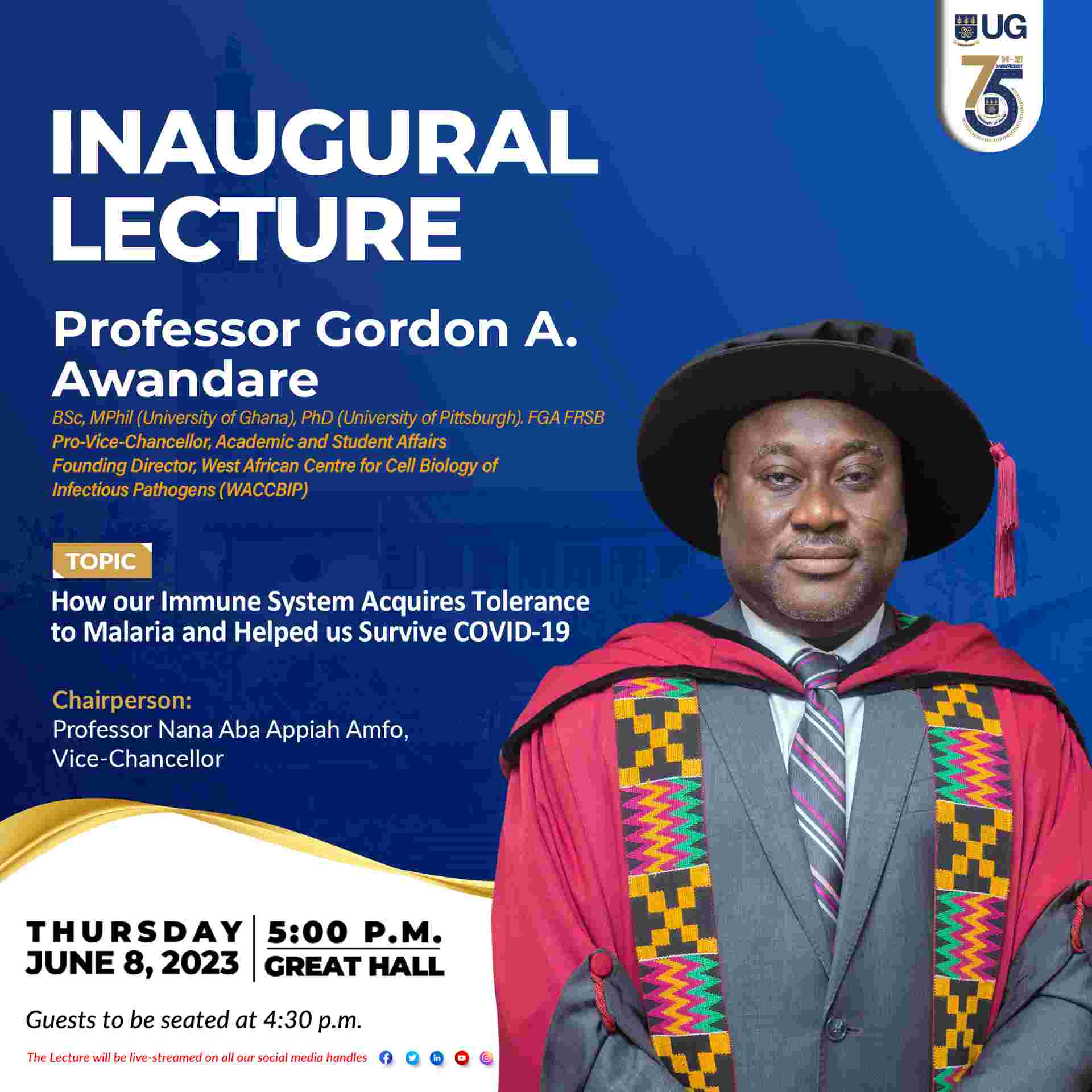
Les étudiants se prêtent au jeu grâce au challenge “3 minute thesis”
Le Symposium international du réseau de recherche Wanida sur les maladies infectieuses, qui a eu lieu à Accra du 8 au 10 mars 2023, a été une formidable occasion pour les étudiants volontaires du réseau WANIDA de se prêter à un exercice de vulgarisation et de synthèse de leur sujet de recherche.
Renforcer les capacités des étudiants : un enjeu clé pour ACE Partner
La palette de compétences du chercheur est très large : écriture d’articles scientifiques, levée de fonds etc. ACE Partner a déployé une stratégie de formation solide pour permettre aux membres des différents réseaux de s’outiller et faire face aux nombreuses exigences de ce cursus.
Pour valoriser son travail, le chercheur a de nombreuses occasions de présenter ses résultats, lors de colloques ou de rencontres informelles. C’est dans cette optique que le réseau WANIDA a organisé une série de webinaires pour donner les clés de la structuration d’un exposé scientifique et de l’art oratoire.
Découvrez les catalogues des formations ACE Partner :
https://drive.google.com/file/d/1TLiNUdGAHFHIk_WG_pHqpi2P5_L2u-rA/view
https://drive.google.com/file/d/1YP1S31HJJAyV0vN3t5TdYJ_UJrJYs1AG/view
Un coaching personnalisé et un concours devant un salle comble d’experts internationaux
19 étudiants boursiers du réseau WANIDA ont pu bénéficier d’un coaching sur mesure, en anglais et en français pour renforcer leurs compétences et se préparer au Challenge Ma Thèse en 3 minutes / 3 minute thesis
- Structuration de son exposé scientifique.
- Art oratoire et prise de parole en public.
Cette formation orchestrée par Meryam Ziani, experte en vulgarisation scientifique, a aussi mobilisé plusieurs intervenants :
- Eldaa Koama, experte en art oratoire et CEO de Improv’you.
- Ahouefa Reine Katte, spécialisée en génie civil et lauréate du concours Ma thèse en 180 secondes au Kenya en 2022.
- Daouda Guebre, chercheur et professeur en agropédologie à l’Université de Ziniaré (Burkina Faso) et lauréat du concours Ma thèse en 180 secondes du centre d’excellence 2IE.
Félicitations aux 9 finalistes et aux 4 gagnants !
La finale du challenge “3 minute thesis” a eu lieu le 9 mars à Accra lors du Symposium WANIDA et 9 étudiants ont pu s’essayer à cet exercice trépidant. Effets de la pollution de l’eau sur la santé, paludisme, risques liés à la grossesse, etc. Les sujets étaient divers et les étudiants ont relevé le défi avec brio ! Face à leurs performance les 2 prix qui devaient être originellement attribués par le jury se sont transformés en 4 prix ! Le jury a salué la qualité des présentations et a insisté sur la difficulté à choisir des lauréats.
- 1er prix décerné à DOKPOMIWA Houeffa Adeline Tatiana
1500 € pour participer à un événement scientifique et la production d’une bande dessinée pour valoriser son sujet de recherche. - 2nd prix ex-aequo décerné à TRAORE Bintou Fatoumata
1000 € pour participer à un événement scientifique - 2nd prix ex-aequo décerné à TOURE Aly Badara
1000 € pour participer à un événement scientifique - 3e prix décerné à CAMPBELL Julian Sydney Olufemi
500 € pour participer à un événement scientifique.
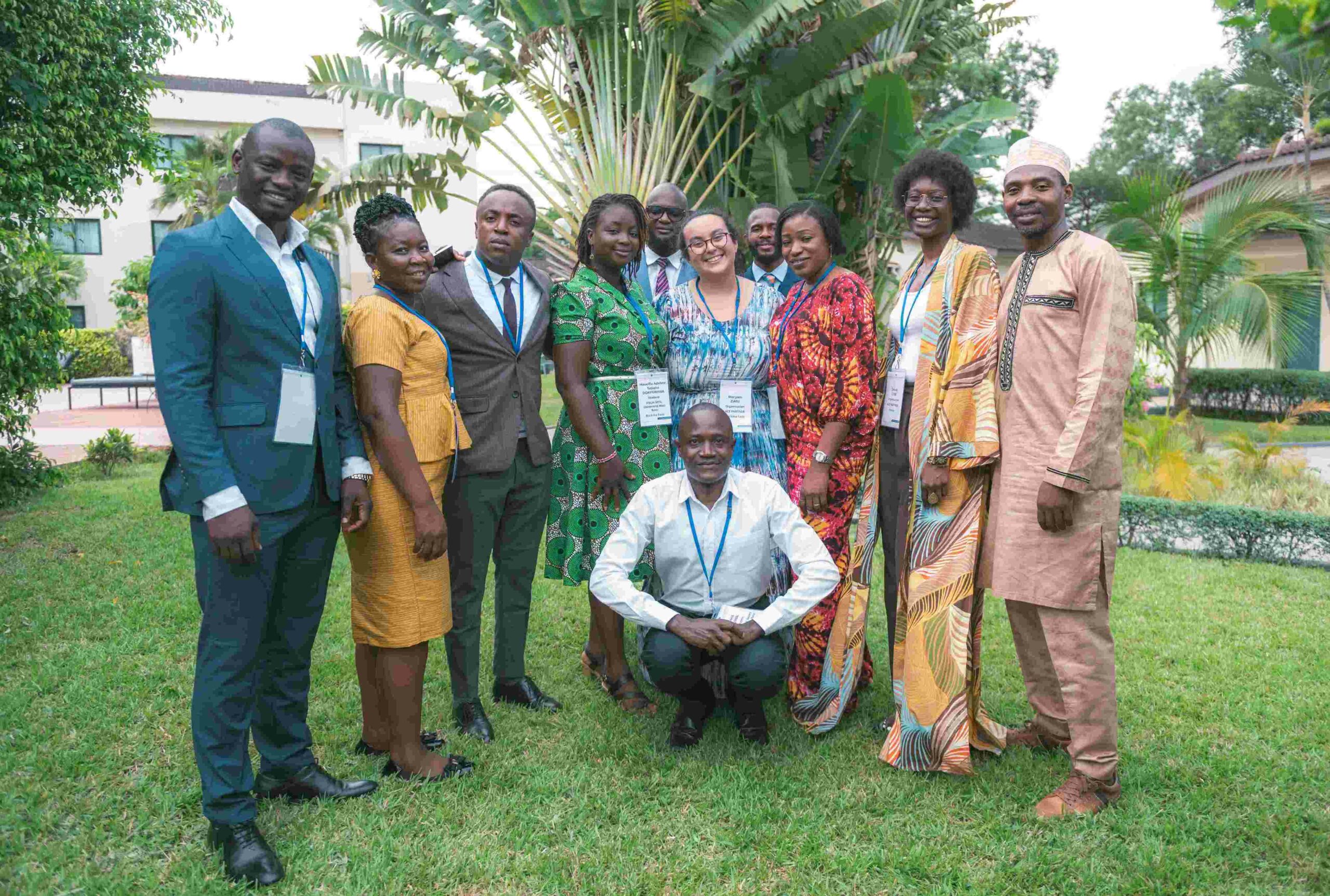
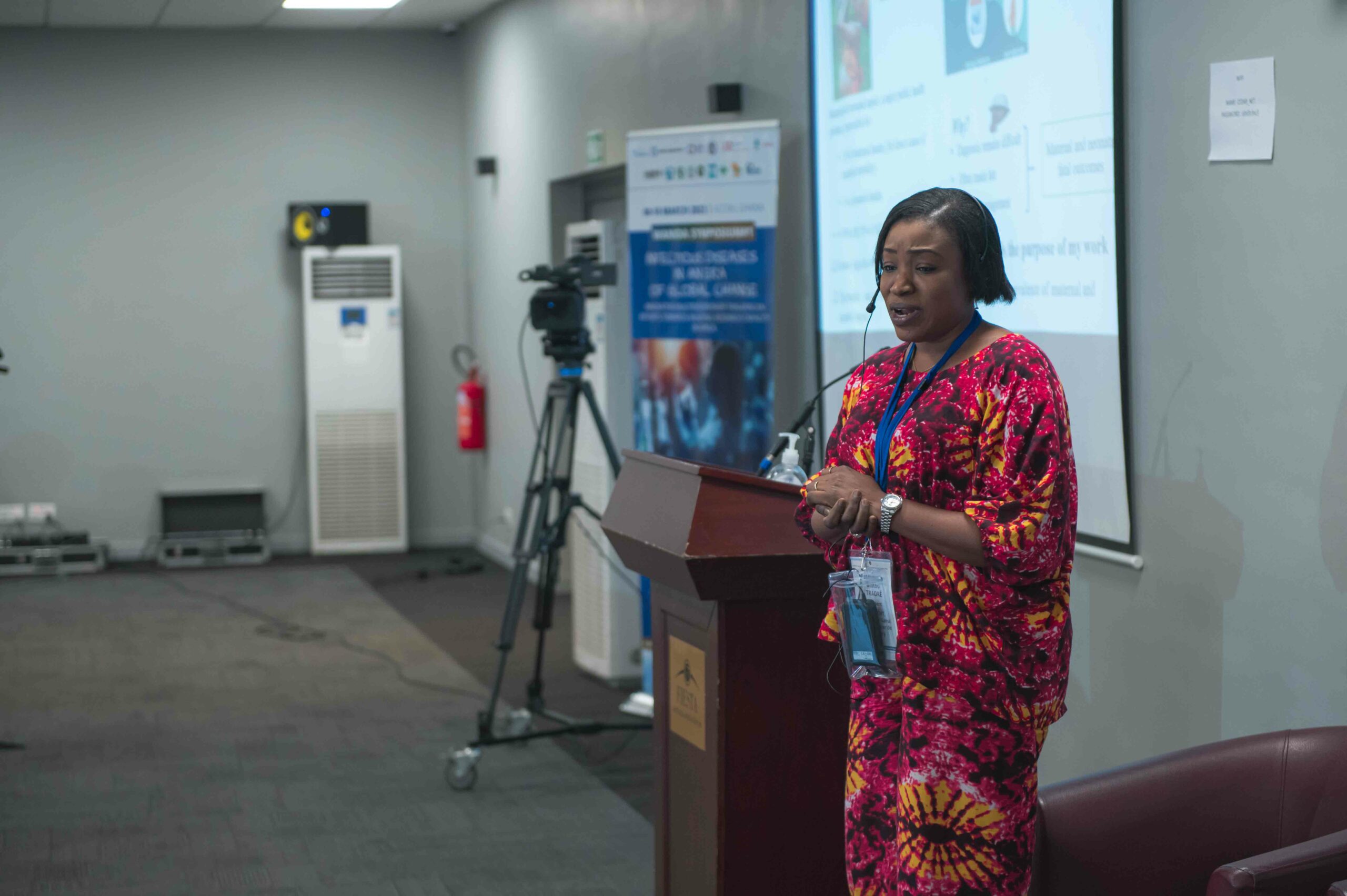


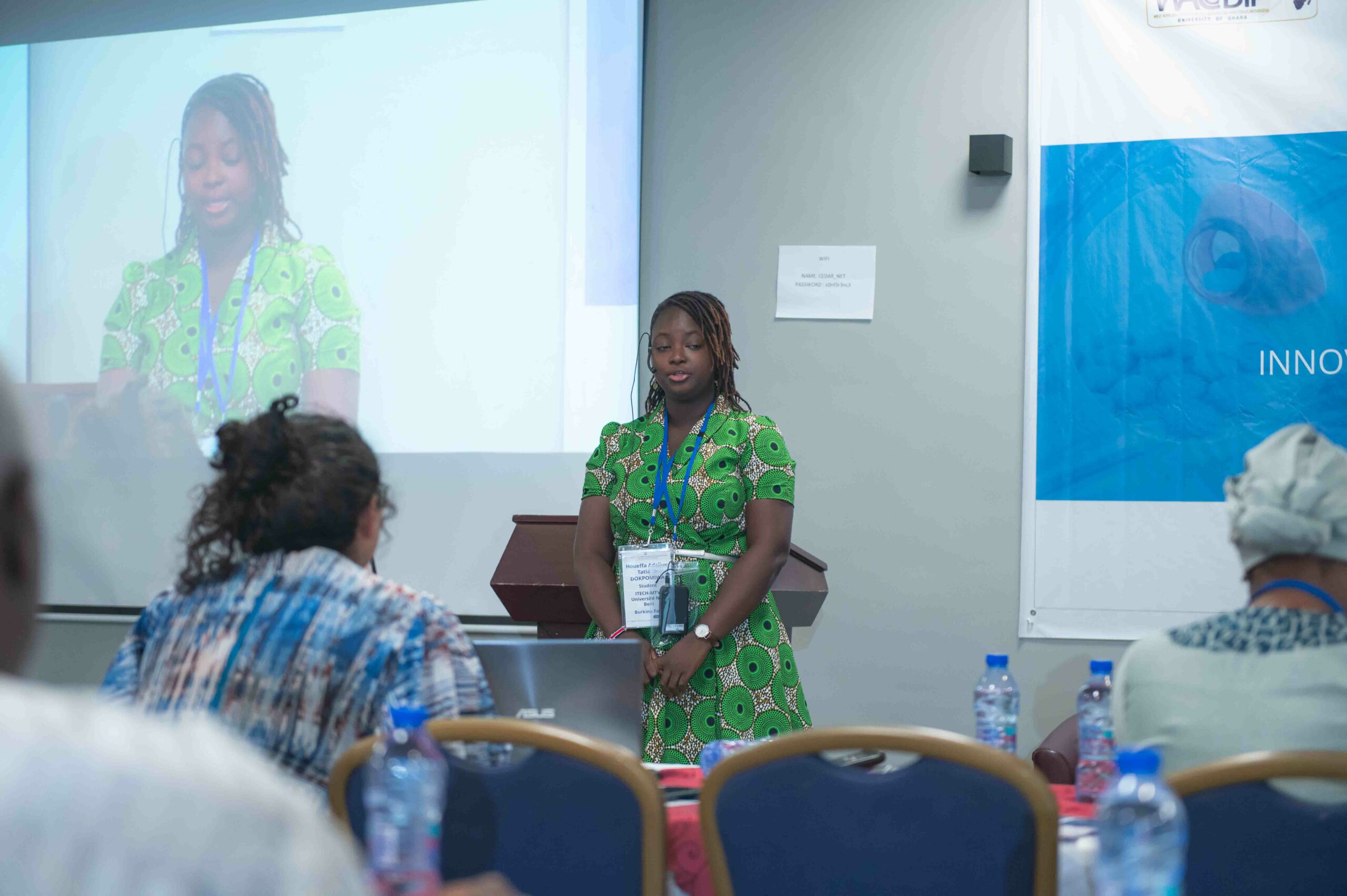


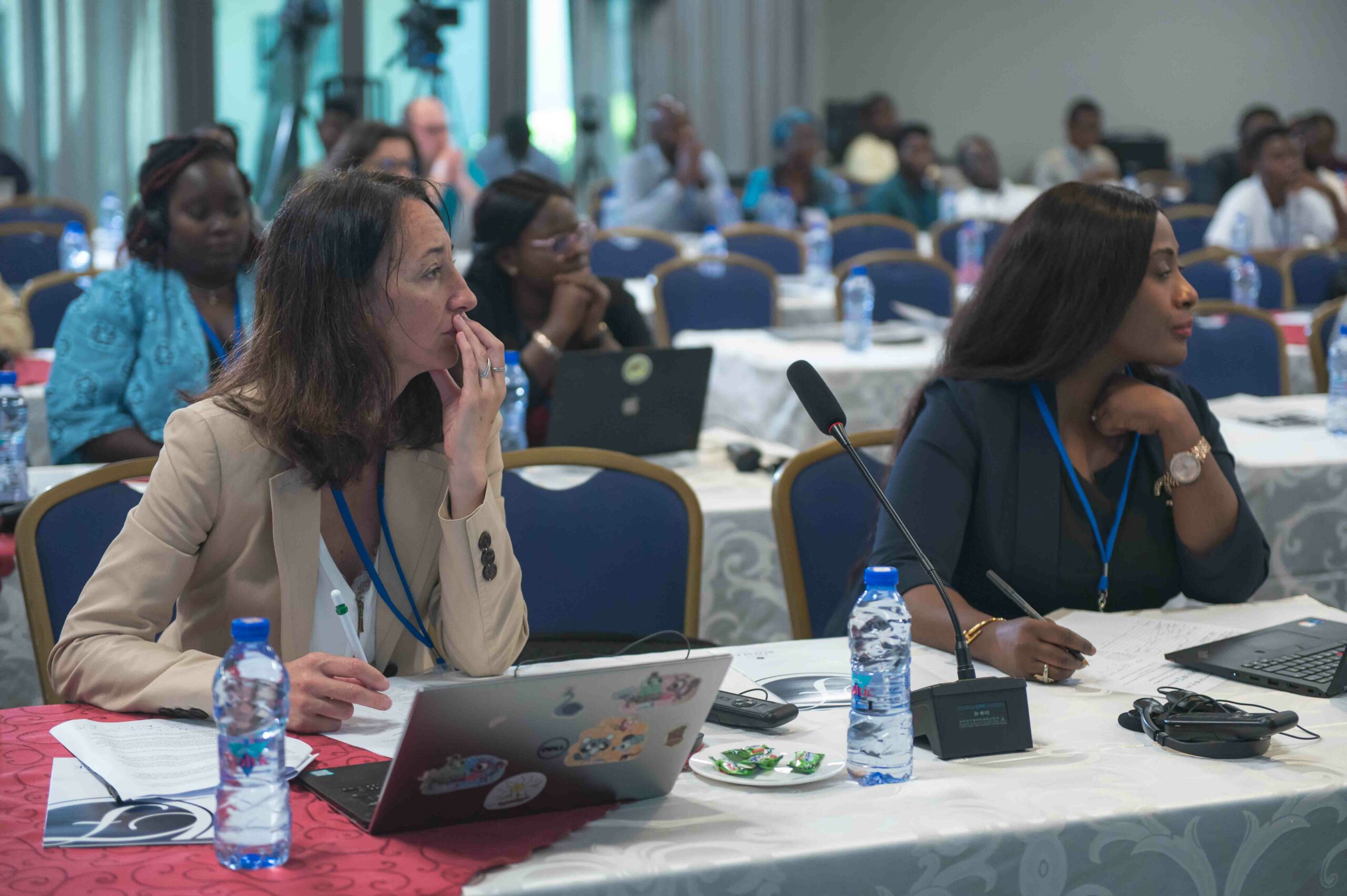


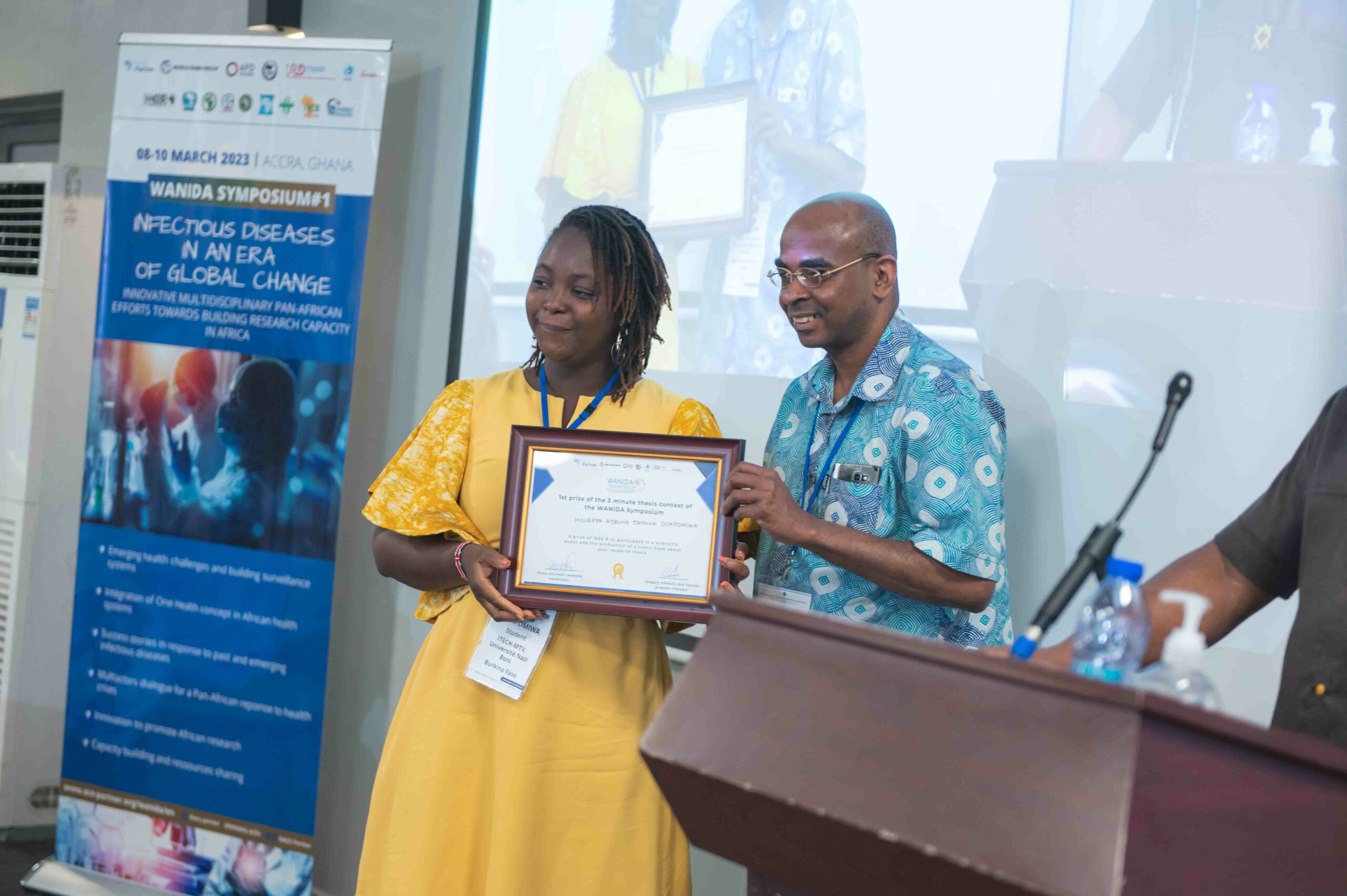
Découvrez les catalogues des formations ACE Partner :
https://drive.google.com/file/d/1TLiNUdGAHFHIk_WG_pHqpi2P5_L2u-rA/view
https://drive.google.com/file/d/1YP1S31HJJAyV0vN3t5TdYJ_UJrJYs1AG/view
Le réseau de recherche d’excellence WANIDA a organisé son premier Symposium hybride du 8 au 10 mars 2023 à Accra, au Ghana sur le thème : « LES MALADIES INFECTIEUSES À L’ÈRE DU CHANGEMENT GLOBAL : LES EFFORTS PANAFRICAINS MULTIDISCIPLINAIRES INNOVANTS POUR RENFORCER LES CAPACITÉS EN AFRIQUE ».
Un bilan très positif pour ce Symposium du réseau, qui a permit de réunir près de 300 personnes en présentiel et plus de 200 personnes en ligne chaque jour ! Une première pour le réseau qui a réussi à mobiliser des acteurs internationaux représentants 152 institutions à travers 31 pays ! Merci de votre participation !
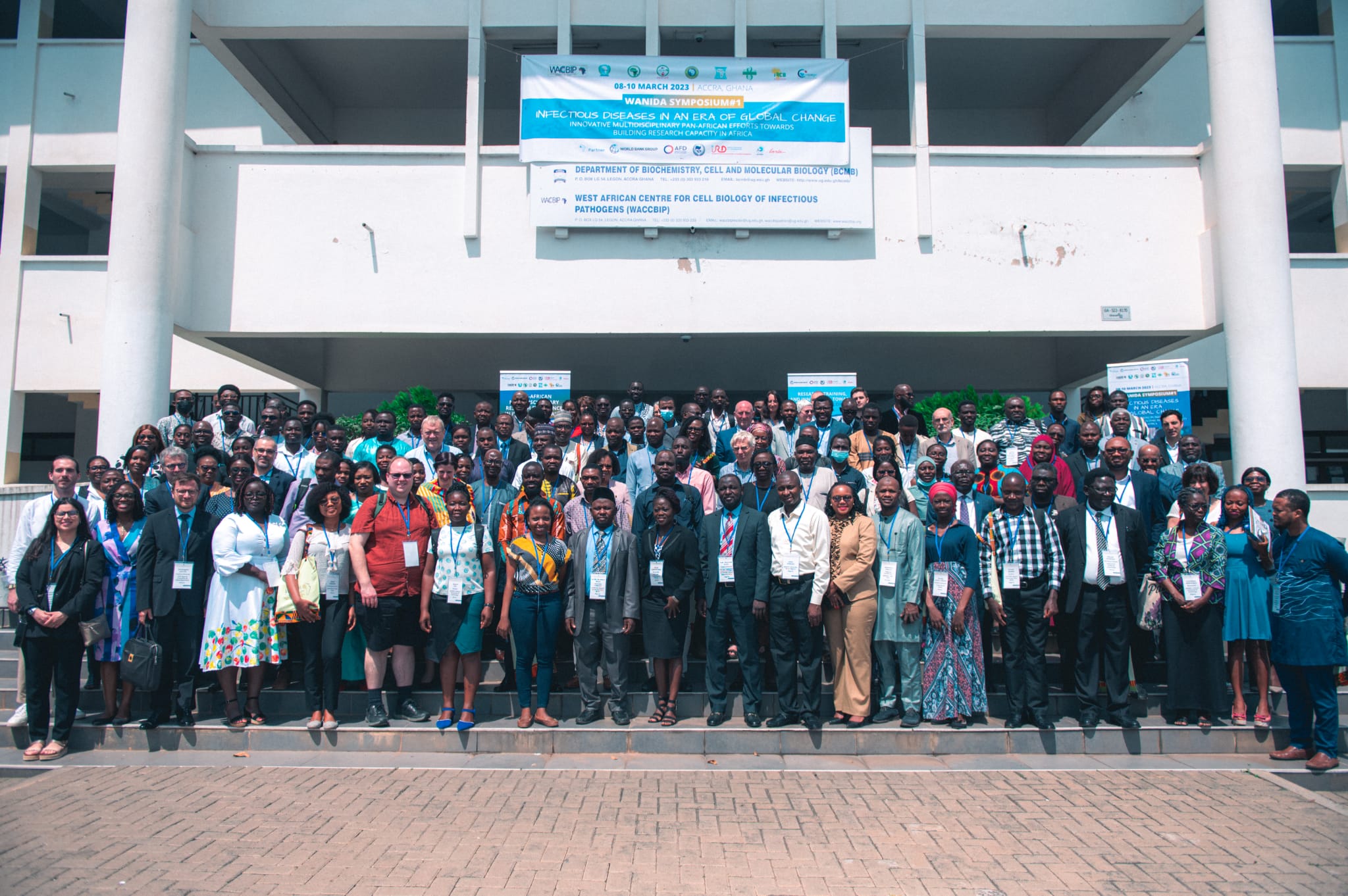
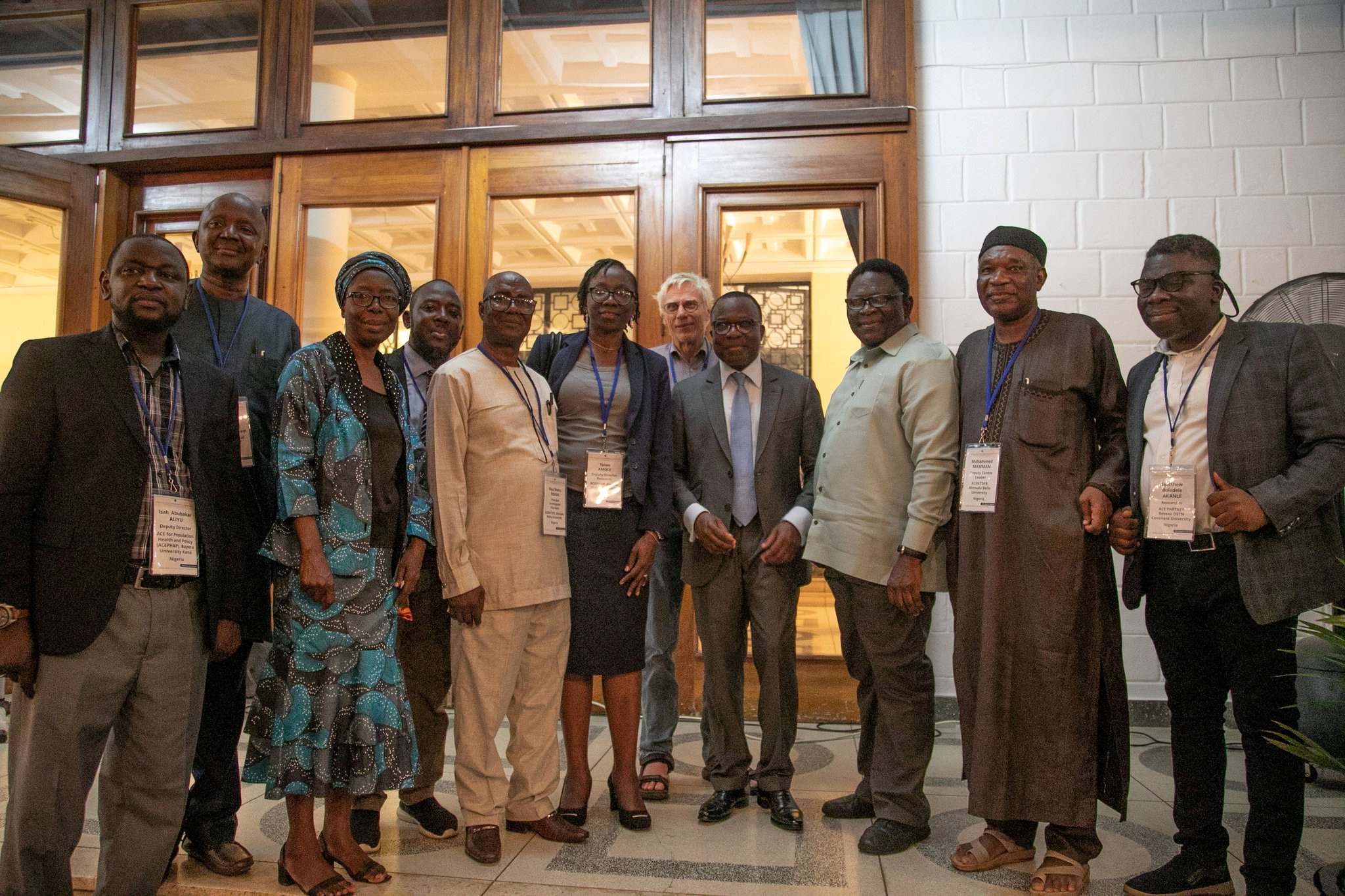













Le réseau de recherche d’excellence WANIDA organise son premier Symposium hybride du 8 au 10 mars 2023 à Accra, au Ghana sur le thème : « LES MALADIES INFECTIEUSES À L’ÈRE DU CHANGEMENT GLOBAL : LES EFFORTS PANAFRICAINS MULTIDISCIPLINAIRES INNOVANTS POUR RENFORCER LES CAPACITÉS EN AFRIQUE ».
Dans le cadre du Symposium WANIDA, 10 étudiants du réseau WANIDA participeront au Concours « Ma thèse en 3 minutes ». Ils présenteront leur sujet de recherche, dans un format court, original et compréhensible par tous .
Retrouvez-les en ligne le jeudi 9 mars 2023 à partir de 14h30 !
Cet événement sera retransnmis par Zoom, pour vous connecter, inscrivez-vous sur : https://my.weezevent.com/wanidasymposium

Cet événement sera retransnmis par Zoom, pour recevoir le lien de connection, inscrivez-vous via le lien suivant : https://my.weezevent.com/wanidasymposium2023
Le réseau de recherche d’excellence WANIDA a organisé son premier Symposium hybride du 8 au 10 mars 2023 à Accra, au Ghana sur le thème : « LES MALADIES INFECTIEUSES À L’ÈRE DU CHANGEMENT GLOBAL : LES EFFORTS PANAFRICAINS MULTIDISCIPLINAIRES INNOVANTS POUR RENFORCER LES CAPACITÉS EN AFRIQUE ».

LE PROGRAMME :
8th march 2023
THE AFRICAN HEALTH CHALLENGES
WACCBIP – Conference Room
Main Entrance in front of St. Thomas Aquinas Catholic Church, Volta Road, Accra (within the University of Ghana, Legon Campus)
9h to 10h: Opening Ceremony
- Master of ceremony: Prof. Gordon AWANDARE FGA, ProVC ASA UG, Director WACCBIP
- Opening remarks: Prof. Gordon AWANDARE FGA, Pro Vice-Chancellor, Academic and Student Affairs (ASA), University of Ghana, Director WACCBIP, Chairperson WANIDA
- Chair person : Prof. Nana Aba AMFO Vice-Chancellor, University of Ghana
- Guest of Honour : Dr. Patrick KUMA-ABOAGYE, Director General, Ghana Health Service
- Guest of honour: Prof. Oyewole OLUSOLA, Association of African Universities (AAU)
- Stakeholders:
- Ekua BENTIL, Senior Education Specialist, World Bank (TBC)
- Jules Armand ANIAMBOSSOU, Ambassador of France in Ghana, represented by Florent ENGELMANN Jean Hugues DE FONT REAULX, Deputy director, Agence Française de Développement (AFD)
- Keynote speaker : Dr. Patrick DUFFY, Chief, Laboratory of Malaria Immunology and Vaccinology; Chief, Vaccine Development Unit; Chief, Pathogenesis and Immunity Section, National Institute of Health (NIH), Bethesda, MD
10h : Family picture and Poster Session
11h to 13h: Emerging Health Challenges and Building Surveillance systems within the One Health
Framework
Session Chair: Dr. Gloria AMEGATCHER
11h to 11h 20 / Plenary 1
Dr. Isah Abubakar ALIYU, Africa Center of Excellence for Population Health and Policy (ACEPHAP), Bayero University Kano, Nigeria
Tracking SARS-CoV-2 Infection in Nigeria to Guide Public Health Intervention
11h20 to 11h 40 / Plenary 2
Prof. Ousmane KOITA, Director, Laboratory of Applied Molecular Biology (LBMA), University of the Sciences, Techniques and Technologies of Bamako, Mali
Covid-19 pandemic: Surveillance and Monitoring of Population of SARS-CoV-2 in a network of diagnosis laboratories in Mali
11H40 to 12h /Plenary 3
Dr. Issa DIARRA, Laboratory of Applied Molecular Biology, Mali
Circulating Emerging Viruses: Zika, Chikungunya and O’nyong nyong virus seroprevalence study in Mali
Session Chair: Dr. Jacques KPODONOU
12h to 12h20 / Plenary 4
Dr. Firmin KRA, Socio-anthropologist, Institut Robert Koch, Chaire Unesco de Bioéthique/Université Alassane Ouattara, Cote d’Ivoire
& Prof. Alice DESCLAUX, MD, PhD, Medical anthropologist, DR TransVIHMI (Université de Montpellier, Institut national de la santé et de la recherche médicale (INSERM), Institut de Recherche pour le Développement (IRD)
How to get prepared for considering the social dimensions of pandemics? A training initiative
12h20 -13h / Round table 1
Emerging Health Challenges and Building Surveillance systems within the One Health Framework
Moderator: Jacques Kpodonu, MD, FACC, Cardiac surgeon Beth Israel Deaconess Medical Center, Assistant Professor Surgery Harvard Medical School
– Dr. Joseph Oliver COMMEY, Acting Director, Ghana Infectious Disease Centre (GIDC)
– Dr. Janeth George LAUREAN, Postdoctoral fellow, SACIDS Foundation for One Health-Sokoine University of Agriculture (SUA), Tanzania
– Dr. Benedicta Ayiedu MENSAH, Research Fellow / Quality Manager, Department of Epidemiology, Noguchi Memorial Institute for Medical Research, University of Ghana
– OnlineProf. Onikepe FOLARIN, Deputy Centre Leader, ACEGID, Redeemer’s University, Nigeria; WANIDA partner
14h30 – 16h10 Strategies for vector-borne disease control and elimination
Session Chair: Dr. Peter QUASHIE
14h30 – 15h10 / Keynote speaker:
Dr. Claude OEUVRAY, Head of Global Health Development Program (Malaria), Merck, Germany
Insights on Merck Global Health integrated innovation and partnership strategy as a way to transfer decisioning to African stakeholders
& Delalih MANTEAU, Project Manager, Merck Global Health Institute Insights on Merck Global Health integrated innovation and partnership strategy as a way to transfer decisioning to African stakeholders
15h10 – 15h30 / Plenary 5Online
Dr. Claudia DEMARTA, Global Health Scientist, Merck, Germany
The value of P. falciparum field isolates for the prioritization of drug combinations to derisk malarial drug development: the case of Cabamiquine (M5717) – Pyronaridine
15h30 – 15h50 / Plenary 6Online
Dr. Fredy Brice SIMO NEMG, Postdoctoral fellow, Centre for Research in Infectious Disease, Department of Biochemistry, University of Yaoundé 1, Cameroon (TBC)
Clinical, Biochemical and virological study of the co-circulation of plasmodium, SARS-CoV-2, dengue and chikungunya in febrile patient’s in two hospitals of Yaoundé VI
15h50 – 16h10 / Plenary 7
Dr. Etienne BILGO, Senior Postdoctoral Researcher, ARISE grantee, Wellcome Trust Fellow, Institut de Recherche en Sciences de la Santé (IRSS), CEA/ITECH-MTV, Burkina Faso
Wolbachia-conferred protection of African Ae. aegypti against the entomopathogenic fungus Metarhizium pingshaense
16h15 University of Ghana guided tour (optional)
20h WANIDA Symposium Gala Diner at the Fiesta Royale Hotel (on invitation)
9th march 2023
PAN AFRICAN RESPONSES TO HEALTH CRISES
FIESTA ROYALE HOTEL – CEDAR Conference Room
George Walker Bush Highway, North Dzorwulu, Accra, Ghana
9h to 12h30: Success Stories in response to past and emerging infectious diseases
Session Chair: Sylvie BOYER, Aix Marseille University/IRD
9h – 9h10
Prof. Nicaise NDAM, Research Director, IRD; Adjunct Professor, University of Ghana, Scientific advisor, WANIDA, IRD Regional Representative for Benin, Nigeria, Togo and Ghana
9h10 – 9h50 / Keynote SpeakerOnline
Dr Yaw BEDIAKO, CEO Yemaachi Biotechnology, Ghana
9h50 – 10h10 / Plenary 8
Dr. Peter Kojo QUASHIE, Deputy Director Research, WACCBIP, University of Ghana
The Silver Lining: The Evolution of SARS-CoV-2 Research at WACCBIP
10h10 – 10h30 / Plenary 9
Umar YUNUSA, RN, MSc, FWACN, Lecturer, Department of Nursing Sciences, Bayero University Kano, African Center of Excellence in Population Health and Policy (ACEPHAP), Bayero University Kano, Nigeria (TBC)
Effect of Mobile Phone Text Message and Call Reminders in the Completeness of Routine Childhood Immunization in Kano State, Nigeria
Coffee break and Poster Session
Session Chair: Peter Kojo QUASHIE
11h – 11h15 / Oral 1 Room 1
Kesego TAPELA, PhD student, West African Centre for Cell Biology of Infectious Pathogens (WACCBIP), Department of Biochemistry, Cell and Molecular Biology, University of Ghana (WANIDA fellow)
Deciphering the Cellular Immune Response to SARS-CoV-2 and link to Malaria exposure in Ghanaian COVID-19 patients
And in parallel
Oral 6 Room 2:
Idrissa DIENG, Institut Pasteur de Dakar
Placement of portable laboratory based on Recombinase Polymerase Amplification (RPA) in low income settings reveal the circulation of Dengue virus serotype 1 of Asian Origin in Senegal
11h15 – 11h30 / Oral 2 Room 1 Online
Francine Berlange SADO YOUSSEU, PhD student, Centre for Research in Infectious Diseases, Cameroon
Seroprevalence of Rift Valley fever virus in domestic ruminants in Cameroon
And in parallel
Oral 7 Room 2
Djèlili BIAOU, Phd Student, IRD Université de Paris Cité
Influence des hybrides de schistosomes dans la modulation de la réponse anticorps dirigée contre les antigènes candidats vaccins de Plasmodium falciparum
11h30 – 11h45 / Oral 3 Room 1
Priya GODARA Online, PhD student, Central University of Rajasthan, India (TBC)
A rational approach for designing peptide-ligand conjugates-based immunotherapy against the complicated malaria
And in parallel
Oral 8 Room 2
Franklin Yengdem NUOKPEM, PhD student, West African Centre for Cell Biology of Infectious Pathogens (WACCBIP), Department of Biochemistry, Cell and Molecular Biology, University of Ghana
Sequence, structure, and antibody profile of the circumsporozoite protein from three Plasmodium species
Session Chair: Dr. Mariama Sadjo DIALLO
11h45 – 12h / Oral 4 Room 1
Umar SAIDU, Master’s student, Ahmadu Bello University, Zaria, Nigeria
Cell-based screening of Merck KGaA’s health care open global health library for identification of new drug candidate for the treatment of schistosomiasis
And in parallel
Oral 9 Room 2
Edem ADIKA, Master’s student, WACCBIP, University of Ghana
Molecular Determinants of Plasmodium falciparum Antimalarial Drug Tolerance in Ghana
12h – 12h15 / Oral 5 Room 1 Online
Abdoulie O. TOURAY, PhD student, McGill University, Canada
Allosteric regulation of repressor-activator protein 1 by PI(3,4,5)P3 controls on and off switching of telomeric expression sites in trypanosomes
And in parallel
Oral 10 Room 2
Fatoumata SECK, PhD student, CEA/ITECH-MTV, Université Nazi Boni, (WANIDA fellow)
Genetic diversity of genes involved in the fertility and vector competency of the major malaria vectors from Sub-Saharan Africa
12h15 – 12h30
Presentation IRCB / CERPAGE, Bénin
And in parallel
Oral 11 Room 2
Gabriella ESSUMAN, Master’s student, WACCBIP, University of Ghana
Antileishmanial Activities of Natural and Synthetic Compounds on Leishmania donovani
14h30 – 15h30 Three Minute Thesis Challenge
15h30 to 18h: Multi-actors dialogue for a Pan African response to Health crises
Session Chair: Prof. Amidou SAMIE
15h30 – 15h50 / Plenary 10
Dr. Sonou Dit Balla DIARRA, Ministry of Health, Mali Online
Traitement de masse annuel contre les schistosomiases et les géo helminthiases à Ségou, Mali est- il justifié ? Propositions des stratégies alternatives d’amélioration
15h50 – 16h10 / Plenary 11
Dr. Funmilola ADEFOLALU, Department of Biochemistry Federal University of Technology, Minna; ACEMFS Nigeria
Evaluation of culex mosquito susceptibility o organophosphate, organocarbamate and pyrethroid insecticides in Minna, Niger State
Session Chair: Dr. Mamadou DIALLO
Moderator : Hélène Kirchner, Scientific coordinator of the Digital Science and Technology Network, INRIA
16h30 – 17h10 / Round table 2 : Innovative technologies in response to Africa’s Health Challenges
– Dr. Adewoyin OGUNMOLASUYI, Postdoctoral fellow, Rhodes University, Grahamstown, South Africa
– Prof. Daouda MAMA, Director, National Water Institute Bénin (Sustainable Water management network/NET-WATER)
– Online Dr. Mouhamadou Lamine BA, AI-based analytical framework for the prevention and the monitoring of cardio-vascular diseases in Africa-AI4CARDIO project, African Center of Excellence in Mathematics, Computers and ICT (CEA MITIC), Digital Science and Technology Network (DSTN), Senegal
– Eng. Mr Boladele Matthew AKANLE, Federated Genomics-FEDGEN Project, Covenant Applied Informatics and Communication Africa Centre of Excellence, (CApIC ACE), Digital Science and Technology Network (DSTN), Nigeria
– Dr. Gaoussou CAMARA, National Medical Information System for Senegal-SIMENS Project, African Center of Excellence in Mathematics, Computers and ICT (CEA MITIC), Digital Science and Technology Network (DSTN), Senegal
17h10 – 17h25 / Plenary 12 Online
Piyusha MAJUMDAR, Assistant Professor, IIHMR University, Jaipur, India
Multipronged Review to determine Implementation challenges and evolving malaria Control strategies in Tribal Areas in India: From Global Strategies to Local Innovation
And in parallel
Oral 14 Room 2
Fatoumata KASSE, PhD student, Malaria Research and Training Center, Mali (TBC)
Trends of Artemether-Lumefantrine treatment failure during routine consultation in Dangassa community health center, a Malian village with long seasonal malaria transmission
17h25 – 17h40 / Oral 12 Room 1
Aminu YUSUF, PhD student, ACENTDFB, Ahmadu Bello University
DNA Vaccine encoding Trypanosoma brucei Major Surface Protease-B induced IgG response and confers Partial Protection in Immunized BALB/c mice
And in parallel
Oral 15 Room 2
Rejoice EKLI, PhD student, ACEMFS, Federal University of Technology Minna, Nigeria, WANIDA fellow Amoxicillin resistant Salmonella enterica isolates from ready-to-eat (RTE) meats and their environments in Accra, Ghana
17h40 – 17h55 / Oral 13 Room 1
Achaz-Achim Mawugnon AGOLINOU, PhD student, CEA/ITECH-MTV, IRSS, Université Nazi Boni, Burkina Faso
Design in silico of molecular model to study the SIFamide gene function in Anopheles gambiae olfactory system, in a perspective of genetic control of the vector
And in parallel
Oral 16 Room 2
Peter Yunenui MAHBOU, PhD student, ACENTDFB, Ahmadu Bello University, Zaria, Nigeria (WANIDA fellow) Seroprevalence of Dengue Virus and Co-infection with Malaria and Typhoid in Pyretic Patients in Some Hospitals in Cameroon
10th march 2023
AFRICAN RESEARCH NETWORKS OF EXCELLENCE:
ADDRESSING THE HEALTH CHALLENGES IN AFRICA
FIESTA ROYALE HOTEL – CEDAR Conference Room
George Walker Bush Highway, North Dzorwulu, Accra
9h – 13h15: Innovation to promote African research and valorization of research
Session Chair: Prof. Nicaise NDAM
9h – 9h40 Keynote speaker
Prof. Jean LANGHORNE, Principal Group Leader, The Francis Crick Institute, Director, Crick African Network
The Crick Africa Network: supporting the next generation of African science leaders
9h40 – 9h50 / Presentation PASTEUR Network by Prof. Yap BOUM II, Executive Director, Institut Pasteur de Bangui, Central African Republic
9h50 – 10h / Presentation of Global Africa by Prof. Mame Penda BA, Chief editor
10h – 10h15 / Presentation CERMES, Niger by Dr. Ronan JAMBOU, Director Centre de Recherches Médicales et Sanitaires (CERMES), Niger
10h15 – 11h / Networking & Poster session in room KUSIA
Session Chair: Dr. Isah Abubakar ALIYU
11h – 11h15 / Oral 17 Room 1 Online
Moctar CHAIBOU, Researcher, Organic Synthesis And Natural Products Laboratory (LASNASO), Faculté des sciences et techniques, Université Abdou Moumouni, Niger
Anthelminthic evaluation and phytochemical exploration of chrozophora brocchiana (Euphorbiaceae), plant used as antiparasitic in Niger, based on molecular networking enhanced (MolNetEnhancer) guided dereplication
And in parallel
Oral 22 Room 2
Christine MOORE, PhD student, West African Centre for Cell Biology of Infectious Pathogens (WACCBIP), Department of Biochemistry, Cell and Molecular Biology, University of Ghana
Antileishmanial effects and mode of action of phenolic compounds and Glucantime combinations on Leishmania donovani
11h15 – 11h30 / Plenary 13
Prof. Amidou SAMIE, Associate Professor, Department of Microbiology, University of Venda, South Africa
Interleukin 10 (IL-10) Production, and Seroprevalence of Entamoeba histolytica infection among HIV-infected patients in South Africa
And in parallel
Oral 23 Room 2
John SANDI, PhD student, West African Centre for Cell Biology of Infectious Pathogens (WACCBIP), Department of Biochemistry, Cell and Molecular Biology, University of Ghana, (WANIDA fellow)
Evidence of robust antiviral response in the upper respiratory interface of SARS-CoV-2 infected Ghanaians
11h30 – 11h45 / Oral 18 Room 1
Dr. Firmin KRA, Socio-anthropologist, Institut Robert Koch, Chaire Unesco de Bioéthique/Université Alassane Ouattara, Cote d’Ivoire
From preparedness to response : a socio-anthropological contribution from a study of funeral rites in Côte d’Ivoire
And in parallel
Oral 24 Room 2
Agossi Edwige KPODO, Master’s student, CEA-ITECH-MTV, Université Nazi Boni, (WANIDA fellow)
Epidémiologie moléculaire des virus de la dengue autour des foyers endémiques dans la ville de Bobo-Dioulasso, à l’ouest du Burkina-Faso
Session Chair: Prof. Iliya Shehu NDAMS
11h45 – 12h / Oral 19 Room 1
Dr. Aliyu EVUTI HARUNA, PhD student, Africa Center of Excellence for Mycotoxin and Food Safety (ACEMFS), Federal University of Technology, Minna, Nigeria
Sero-prevalance and assessment of knowledge attitude and practices of camel handlers regarding brucellosis and consumption of camel milk and urine in east senetorial district of yobe state, Nigeria
And in parallel
Oral 25 Room 2
Youssouf DIARRA, PhD student, Laboratory of Applied Molecular Biology, University of Sciences, Techniques and Technologies of Bamako, Mali
Malaria Pre-elimination Stage: Use of the Universal Coverage with Long-Lasting Insecticidal Nets, Active Case Detection and Free Treatment of Uncomplicated Malaria with Artemisinin Combination Therapies.
12h15 – 12h30 / Oral 20 Room 1 Online
Léadisaelle Hosanna LENGUIYA, PhD student, Université Marien Ngouabi, Republic of Congo
SARS-CoV-2 infection in pets from COVID-19 positive households in Brazzaville, Republic of Congo
And in parallel
Oral 27 Room 2
Youssouf MFOPIT MOULIOM, PhD student, ACENTDFB, Ahmadu Bello University, Zaria, Nigeria (WANIDA fellow)
Characterisation of bacteria with potential sialidase activity from midgut of tsetse flies
12h30 – 12h45/ Oral 21 Room 1
Dr. Ibrahim KARIDIO DIORI, Head of the Platform of Immunology, and Haematology, Centre de Recherche Medical et Sanitaire (CERMES), ARISE Grantee, Niger
Prebiotics: valuable means for a proper prevention, management of malnutrition and communicable diseases in infants/ children
14h to15h20: Insights into Capacity building and resources sharing
Session Chair: Maissa MBAYE
14h00 – 14h20 / Plenary 14
David BAUER, The Francis Crick Institute
Platforms for “Real-Time” Virology & Immunity: Lessons from COVID-19 from West London, West Africa, and Beyond
14h20 – 14h40 / Plenary 15
Florence KOMURIAN – PRADEL, PhD, Head of GABRIEL international research Network, Fondation Mérieux
GABRIEL, an international scientific network serving capacity building in research & surveillance on infectious diseases
14h40 – 15h20 / Roundtable 3 : Scientific Networks: Experience Gained and Lessons Learned
Moderator: Maissa Mbaye, Director, ACE MITIC, Gaston Berger University, Senegal
– Dr. Mariama DIALLO, Deputy Director, CEA-PCMT, Université Gamal Abdel Nasser de Conakry, Guinée, WANIDA partner
– Dr. Florence KOMURIAN – PRADEL, Head of GABRIEL international research Network, Fondation Mérieux
– Prof. Jean LANGHORNE, Principal Group Leader, The Francis Crick Institute; Director, Crick African Network (CAN)
– Prof. Yap Boum II, Executive Director, Institut Pasteur de Bangui, PASTEUR Network.
Closing ceremony
15h20 – 15h50 / Award ceremony for « My 3 minutes Thesis » Challenge & Poster & Oral presentations
15h50 – 16h / Closing remarks: Prof. Gordon AWANDARE FGA, ProVC ASA UG, Director WACCBIP
Cet événement sera traduit en Français et en Anglais.
Cet événement sera retransnmis par Zoom, pour recevoir le lien de connection, inscrivez-vous via le lien suivant : https://my.weezevent.com/wanidasymposium2

Appel : CLOTURÉ
NOUVELLE Date limite de soumission : 4 Janvier 2023
Contact pour demandes d’informations : wanida.symposium@gmail.com
WANIDA organise son premier Symposium hybride du 8 au 10 mars 2023 à Accra, au Ghana sur le thème : « LES MALADIES INFECTIEUSES À L’ÈRE DU CHANGEMENT GLOBAL : LES EFFORTS PANAFRICAINS MULTIDISCIPLINAIRES INNOVANTS POUR RENFORCER LES CAPACITÉS EN AFRIQUE ».
Vous souhaitez proposer une présentation lors du Symposium ?
Soumettez votre résumé, pour une presentation orale ou poster, dans les 5 domaines thématiques suivants :
- Surveillance et préparation aux nouvelles pandémies
- Base pathogénique des maladies et réponses de l’hôte
- Stratégies innovantes de prévention des maladies et vaccinologie
- Les maladies tropicales négligées
- Stratégies de contrôle et d’élimination du paludisme
Les personnes intéressées devront soumettre un résumé d’au moins 300 mots (sans dépasser 350 mots) en anglais ou en français, ansi qu’une courte biographie (100 mots) et une photo.
La présentation sera structurée comme suit :
– Titre
– Contexte
– Méthodes
– Résultats
– Signification
– Présentateur
A noter :
– La soumission d’un résumé implique votre consentement à ce que nous le publiions dans les actes du Symposium.
– Tous les résumés soumis seront examinés et affectés à la session appropriée (orale / poster).
– Tous les auteurs des résumés acceptés sont tenus de participer au Symposium (en ligne ou en personne)
NOUVELLE Date limite de soumission : 4 janvier 2023 !
Pour toute information complémentaire, contactez : wanida.symposium@gmail.com

L’Institut de Recherche Clinique du Bénin – IRCB et le Centre d’Etude et de Recherche sur les Pathologies Associées à la grossesse et à l’Enfance – CERPAGE rejoignent le réseau ouest-africain des Centres d’Excellence Africains sur les maladies infectieuses WANIDA
Afin de développer les partenariats ouest africains en recherche d’excellence sur les maladies infectieuses, le réseau WANIDA intègre deux nouveaux membres : l’IRCB et le LMC CERPAGE. Ces nouvelles collaborations s’inscrivent dans la continuité et le développement du réseau au niveau régional et renforcent les capacités de recherche pluridisciplinaire et d’innovation des membres pour répondre aux enjeux de santé publique en Afrique de l’Ouest.
La multidisciplinarité des équipes permet d’intervenir dans plusieurs domaines : Covid-19, VIH, Paludisme, Tuberculose, Ebola, Infections mycobactériennes, Maladies tropicales négligées, Agents pathogènes d’origine alimentaire ainsi que des études sur les maladies fébriles non paludéennes.
Le réseau WANIDA regroupe désormais 9 membres, dans 5 pays anglophones et francophones : Ghana, Nigeria, Guinée, Burkina Faso, et Bénin.
- West Africa Centre for Cell Biology of Infectious Pathogens (WACCBIP), University of Ghana, Accra, Ghana (centre coordinateur)
- Africa Centre of Excellence for Genomics of Infectious Diseases (ACEGID), Redeemer’s University, Ede, Nigéria
- Africa Centre of Excellence for Mycotoxin and Food Safety (ACEMFS), Federal University of Technology, Minna, Nigéria
- Africa Centre of Excellence for Neglected Tropical Diseases and Forensic Biology (ACENTDFB), Ahmadu Bello University, Zaria, Nigéria
- Africa Centre of Excellence for Population Health and Policy (ACEPHAP), Bayero University, Kano, Nigéria
- Centre d’Excellence africain en Innovations Biotechnologiques pour l’Élimination des Maladies à Transmission Vectorielle (CEA-ITECH-MTV), Université Nazi Boni, Bobo-Dioulasso, Burkina Faso
- Centre d’Excellence africain – Prévention et Contrôle des Maladies Transmissibles (CEA-PCMT), Université Gamal Abdel Nasser de Conakry, Guinée
- Institut de Recherche Clinique du Bénin (IRCB), Abomey Calavi, Bénin
- Le Laboratoire Mixte Commun LMC CERPAGE Centre d’étude et de recherche sur les pathologies associées à la grossesse et à l’enfance, Abomey Calavi, Bénin
ZOOM sur le laboratoire Mixte Commun LMC CERPAGE Centre d’étude et de recherche sur les pathologies associées à la grossesse et à l’enfance
Créé en 2019, le CERPAGE est un Laboratoire Mixte Commun, porté par la Faculté des Sciences et de la Santé de l’Université d’Abomey Calavi (FSS/UAC), par l’Institut de Recherche Clinique du Bénin (IRCB), par le Centre de Lutte Intégrée contre le Paludisme (CLIP), et l’UMR MERIT de l’Institut de Recherche pour le Développement (IRD).
Cette structure partenariale de recherche et de formation a pour objectifs de renforcer leur expertise dans l’étude du paludisme de la femme enceinte et de l’enfant, mais aussi de développer les travaux sur les infections et de nouvelles thématiques sur les maladies non transmissibles de la transition épidémiologique, afin d’améliorer les connaissances permettant la prise en charge et la prévention des maladies de la mère et du jeune enfant dans le cadre de la politique et de stratégies de santé publique en zones intertropicales.
Zoom sur l’Institut de Recherche Clinique du Bénin, l’IRCB
Fondé en 2016 par l’IRD, l’Inserm et le ministère de la Recherche et de l’Enseignement Supérieur et le ministère de la Santé du Bénin, l’IRCB est une plate-forme dédiée à la recherche clinique, dans des thématiques sanitaires prioritaires comme le paludisme, les maladies tropicales et émergentes ainsi que les maladies non transmissibles. L’IRCB souhaite contribuer à la mise en place d’une structure de recherche médicale d’excellence en Afrique francophone et développer des partenariats lors d’essais multicentriques pour mettre à la disposition de chercheurs et d’institutions extérieurs ses moyens et son expertise.
L’Institut est le siège des premiers essais vaccinaux contre le paludisme gestationnel. Plusieurs programmes d’envergure sont en cours comme le projet Deworm 3 (essais multicentriques en cluster portant sur les infections helminthiques – https://depts.washington.edu/deworm3/), ou encore un essai thérapeutique financé par EDCTP sur le traitement du paludisme par une trithérapie à base d’artémisinine – projet ASAAP – https://asaap-malaria.org/).

Contacts :
- Coordinatrice du réseau WANIDA : Olivia Koupaki olivia.koupaki@ird.fr
- Contacts CERPAGE: André Garcia andre.garcia@ird.fr et Aurore Hounto aurorefel@yahoo.fr .
- Contact IRCB : Achille Massougbodji massougbodjiachille@yahoo.fr

©IRD – Rita Saudegbee 

